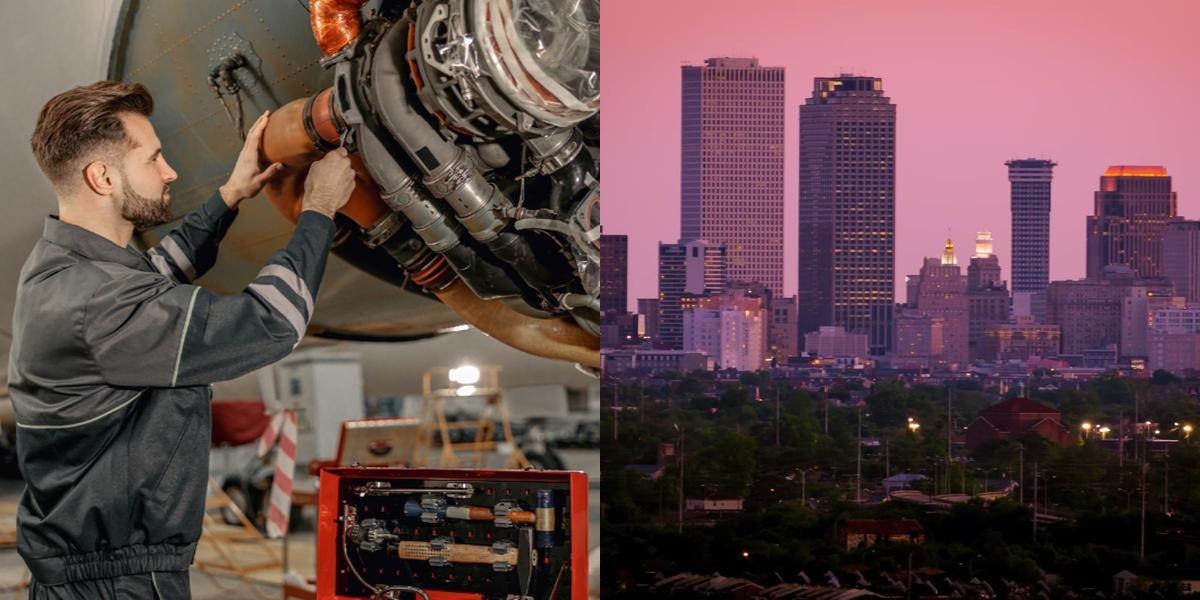How to Become an Aviation Mechanic in Louisiana

Aviation mechanics, also known as aircraft mechanics, are professionals responsible for inspecting, maintaining, and repairing aircraft to ensure they are safe and operate efficiently. They play a crucial role in the aviation industry by ensuring the airworthiness of aircraft.
Step 2: Network
Networking is an essential part of finding a job in any industry, and the aviation industry is no exception. Attend industry events, join professional organizations, and connect with professionals in the field. This can help you stay updated on job opportunities and make valuable connections that could lead to job offers.
Step 3: Search for Job Openings
Utilize online job boards, company websites, and professional networking sites to search for job openings in the aviation industry. Be sure to tailor your application materials to each specific job you apply for, highlighting the skills and experience that make you a good fit for the position.
Step 4: Prepare for Interviews
Once you start receiving interview requests, it's important to prepare thoroughly. Research the company and the position you are applying for, practice common interview questions, and be prepared to showcase your knowledge and skills. Dress professionally and arrive early for the interview to make a good impression.
Step 5: Continue Learning and Growing
The aviation industry is constantly evolving, so it's important to stay updated on the latest advancements and technologies. Consider taking additional courses or certifications to expand your skillset and make yourself more marketable to potential employers. This will also show your commitment to professional development and growth.
Career Paths and Opportunities after Becoming an Aviation Mechanic
After becoming an aviation mechanic, there are several career paths and opportunities you can explore. Here are a few options:
Airline Maintenance Technician
One of the most common career paths for aviation mechanics is to work as a maintenance technician for an airline. In this role, you would be responsible for inspecting, maintaining, and repairing aircraft to ensure they are safe and in working order. This career path can offer stability and the opportunity to work on a variety of aircraft.
Corporate Aircraft Maintenance Technician
Another option is to work as a maintenance technician for a company that owns and operates its own aircraft. This could involve maintaining and repairing corporate jets or other private aircraft. This career path may offer more flexibility and the opportunity to work with high-end, state-of-the-art aircraft.
Aviation Maintenance Instructor
If you enjoy teaching and sharing your knowledge with others, you could pursue a career as an aviation maintenance instructor. In this role, you would teach aspiring aviation mechanics the skills and knowledge they need to obtain their certifications. This career path can be rewarding and allow you to make a positive impact on the next generation of aviation mechanics.
Aviation Inspector
Aviation inspectors are responsible for ensuring that aircraft meet all safety regulations and standards. They conduct inspections and audits of aircraft, maintenance facilities, and repair operations. This career path requires attention to detail and a strong understanding of aviation regulations.
Aviation Maintenance Manager
As you gain experience in the field, you may have the opportunity to move into a management role. Aviation maintenance managers oversee the day-to-day operations of maintenance facilities, manage a team of mechanics, and ensure that all work is completed in a timely and efficient manner. This career path offers the chance to take on more responsibility and potentially higher earning potential.
Final Thoughts
Becoming an aviation mechanic is a rewarding career choice for individuals who have a passion for aviation and a desire to work with their hands. By following the steps outlined in this guide, you can obtain your aviation mechanic certification and start your career in the field. Remember to continue learning and growing in your profession to stay updated on the latest advancements and opportunities. Good luck on your journey to becoming an aviation mechanic!
If you're considering a career shift or curious about different professional paths, Dreambound has written many guides to help you in making informed decisions. Here are a few:

Marce Arnejo is part of the Sales team at Dreambound. Her role involves seeking out schools and institutions to provide valuable opportunities for students seeking a career in the healthcare sector. Beyond her professional life, Marce is passionate about music and gaming. She finds joy in exploring various genres of music and using gaming to unwind and immerse herself in virtual worlds. Her diverse interests enrich her personal life and contribute to her work by bringing new ideas and creativity.




